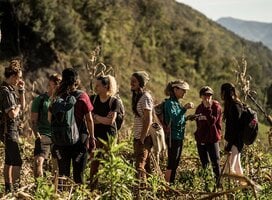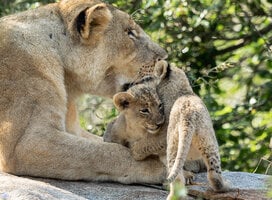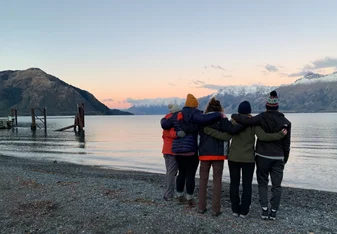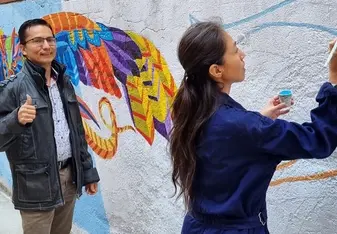Wildlife Conservation Volunteering Programs
Have you ever dreamt of bathing an elephant, immunizing a gibbon, or assisting in dentistry on a hippo? If so, an overseas wildlife conservation program may be for you!
Wildlife conservation aims to protect and preserve ecosystems and the plants and animals that live in them. By volunteering in this important field, you can maintain our natural world, promote biodiversity, and preserve it for future generations. With wildlife conservation work abroad, you can combine your love for animals with traveling to amazing destinations and experiencing their native habitats.
With opportunities all around the world, you can spend a day, a week, a month, or longer assisting in wildlife conversation work and animal care, all whilst experiencing a new culture and country. In many cases, you can make a real difference in wildlife research, or even help orphaned or sick animals on their road to recovery.
However, eco-tourism and wildlife conservation are also big business. A search for wildlife conservation programs worldwide may leave you overwhelmed, due to the sheer number of options available. By reading our volunteer guide, you can ensure that you choose a program that is reputable, ethical, and enjoyable.
Research & tracking programs
Programs that focus on research and tracking are usually run by experienced and educated staff, aiming to learn more about a particular species of animals. In some instances, this might involve watching, monitoring, and tracking animals. While you will not get up close and interact directly with the animals, you will be actively contributing to their ongoing care and conservation in the long run.
Vet volunteer programs
For qualified vets or veterinary nurses, there are programs that cater specifically to your medical skills. These programs will allow you to gain experience caring for and operating on animals you never would dream to see in your home country! You may even be able to pass on your knowledge to local vets to encourage sustainable conservation.
Rescued, orphaned, and sick animal care
If you love getting right into the thick of it, these programs allow you to take part in the everyday care of lots of different animals. This might include preparing food for the wildlife, bandaging or assisting with medical care, weighing animals, building housing, mucking out cages or stalls, and assisting local professionals.
Wildlife rehabilitation programs
If you are an outdoorsy person keen on a sustainable future, rehabilitation programs offer the opportunity to either reintroduce animals to the wild that have been kept as pets illegally or have been harmed during deforestation. You may also work to recreate habitats to allow the animals' eventual release. This work is extremely meaningful and can help stem the tide of poaching and habitat destruction.
With so many different locations and animals to choose from, it can be hard to pick just one program. There are many options for fantastic wildlife conservation programs accessible to volunteers around the world. This means that you can enjoy wildlife conservation work as part of a larger trip, with a number of organizations open to shorter-term volunteers participating in conservation.
Europe
While Europe probably isn’t the first place that springs to mind when you think of wildlife conservation programs, it offers many exciting opportunities for animal and nature lovers. Have you ever considered volunteering at a bear sanctuary in Romania, or tracking wild wolves and lynx in the forests of Slovakia? Didn’t think so!
Asia
If you’re into helping elephants and apes, Asia has tons of offerings. You can undertake short-term volunteering at The Elephant Freedom Project in Sri Lanka, or work in an animal rescue center program in Ho Chi Minh City. Volunteering in Borneo gives you the opportunity to assist with the care of both Orangutans and Sun Bears, two beautiful species that live on the island.
Africa
Africa, the home of the Big 5, offers many unique experiences for volunteering in wildlife conservation. Perhaps you’d like to help with research on carnivore tracking in Namibia, or, if you are a qualified vet, you can take part in a 12 day Vets Gone Wild experience in South Africa. If you’re looking for a slightly different African experience, how about wildlife conservation in the Seychelles, where you can learn to dive and assist with coral reef regeneration projects.
Latin America
If getting up close and personal with a baby sloth or sea turtles sounds like your idea of a good time, how about visiting Costa Rica or Mexico? You can assist SEE Turtles by doing sea turtle research in Baja California. A longer-term option could have you volunteering for up to 24 weeks in Peru, undertaking rainforest rehabilitation and animal tracking conservation work.
Australia
Looking for an opportunity to stick to an English-speaking country? How about volunteering in Australia? You can help the local community by working with injured or sick animals or volunteering at Australia Zoo, an award-winning animal park founded by the famed Steve Irwin, on Australia's Sunshine Coast. Crikey!
Choosing the type of wildlife you would like to work with, and your preferred destination is a big part of choosing a program. You’ll also need to consider your comfort levels –- are you happy living in a rural area with no electricity for two months, or would you prefer something a little more modern? Many opportunities for wildlife conservation offer quite basic facilities. Make sure to read reviews and alumni interviews to get first-hand insight into a volunteer program.
One of the first things you'll need to be mindful of when looking for a wildlife conservation program is identifying a program that is both responsible and ethical. This is certainly not the case for several wildlife volunteer programs abroad. Animal exploitation is a real problem, and many visitors fail to do their research before going overseas. However, the good news is that many reputable programs exist solely for the benefit of animals, and are not quasi-tourist haunts where mistreatment and cruelty are a problem.
Wildlife volunteering programs can run from one day to one year, depending on the content, location, and the type of animal or wildlife it is supporting. It is important to note that, generally, the longer you can stay with a program, the more opportunity you will have to make a difference. While this shouldn’t automatically discount shorter volunteering opportunities, you should be careful to ensure that they are acting in the best interests of their animals, rather than profitability. Here are four types of programs you'll find when looking for wildlife volunteer opportunities abroad:
Many programs can assist you with obtaining a relevant visa for your period of volunteering, and it is sensible to ask early on in the process which visa is required.
Wildlife Conservation Volunteer Programs
Pagination
What People Are Saying
Related Volunteer Abroad Articles
Frequently Asked Questions
-
How can I volunteer to help endangered animals?
There are several ways to volunteer with endangered wildlife abroad including participating in research, helping with daily animal care, using veterinary skills to care for sick animals, and rehabilitating animals so it can be released back into the wild.
-
Why do we need wildlife conservation?
We need to protect the wildlife in our ecosystems because animal species are all interconnected (including us!). We need to promote biodiversity and fight species extinction to keep our Earth healthy and preserve it for future generations.
-
What is wildlife conservation?
Wildlife conservation aims to safeguard our natural environment by focusing on protecting the animals and plants that live in it.

















